Family reunification: a lifeline in crisis, yet out of reach for many
Family reunification: a lifeline in crisis, yet out of reach for many

For refugees, reuniting with family is not just hope, it is a necessity. © UNHCR/Diana Diaz
Imagine escaping a war, violence or persecution, losing your home, your community, everything familiar. You find safety in a new country, hoping to rebuild. But there is a catch, the people you love the most, your family, are left behind, trapped in danger. And despite every effort to bring them to safety, barriers keep them out of reach. For refugees, reuniting with family is not just hope, it is a necessity. It means stability, healing, integration, and a real chance at rebuilding their lives.
The narrow definitions of family and its consequences
Under Swedish law, refugees and beneficiaries of subsidiary protection are permitted to bring only nuclear family members under specific conditions, with few exemptions. However, lengthy waiting times, practical challenges as well as financial, and documentation requirements create obstacles that leave many families in limbo, uncertain of when they will see their loved ones again.
A recent focus group discussion conducted in Sweden highlighted the heartbreaking reality of these policies. Where refugees from different parts of the world, such as Afghanistan, Syria, Eritrea, Sudan and Democratic Republic of Congo shared their struggles, stories of endless paperwork, financial obstacles and the emotional toll of forced separation.
Take the case of a young refugee women, who resettled in Sweden. Her husband's application to join her in Sweden was denied. The reason? She did not meet the maintenance requirements As a new mother caring for an infant, employment was not a realistic option for her at the time. Yet, this rule, which some might consider minor, became an insurmountable barrier to reuniting her family. Her husband, like so many others, remained separated from her, unable to join his wife and child in safety. This story is just one example from many.
Similarly, another refugee woman we spoke to, lost her chance to reunite with her family because she didn’t know about an important rule. Sweden allows refugees to bring their families without proving they have enough money to support them, but only if they apply within three months of getting asylum. She found out about this rule too late, and by then, she had to meet strict financial requirements she couldn’t afford. Just like that, her family had to stay apart.
When speaking to refugees who find themselves in this situation, what we hear is that the loss of not just their home, but their family, friends, belongings, and agency takes a considerable toll on mental health. One refugee described the bittersweet reality of finally reuniting with her son in Sweden, stating that even when reunited, the shadow of loss never fades. The trauma of losing one’s home, community, and family weighs heavily on refugees long after they arrive in a safe country. The constant ache of missing loved ones prevents many from truly moving forward and embracing their new life in Sweden.
The role of family for successful integration
Why is family so essential, especially for those forced to flee their homes? Beyond love and connection, family provides the foundation for stability, healing, and a sense of belonging. As Filippo Grandi, United Nations High Commissioner for Refugees has emphasized “refugees are significantly more likely to integrate effectively when in a unified family”. This is especially important as the questions and concerns about integration continue to accompany the refugee debate. For many refugees, the absence of family doesn’t just leave an emotional void, it directly affects their ability to integrate into Swedish society. Without the emotional support of loved ones, they are often left isolated and disconnected from their new community. This makes it harder for them to focus on rebuilding their lives, finding stable employment, and contributing to society. The absence of family members, who provide love, care, and support, makes these refugees more vulnerable to mental health struggles, such as depression and anxiety, which can further hinder their integration process.
These stories underscore the urgent need for a more compassionate approach to family reunification. Refugees do not flee their homes and countries by choice; rather, they do so out of necessity, often risking everything for the prospect of safety and refuge. Denying them the opportunity to reunite with their loved ones equates to a denial of their humanity and not as effective wellbeing in their host country, as family reunification is a fundamental human right. Stringent requirements such as strict maintenance requirements, time limits and narrow definition of family exacerbate the hardships faced by refugees. At the core of every policy should lie a simple truth: families belong together.









